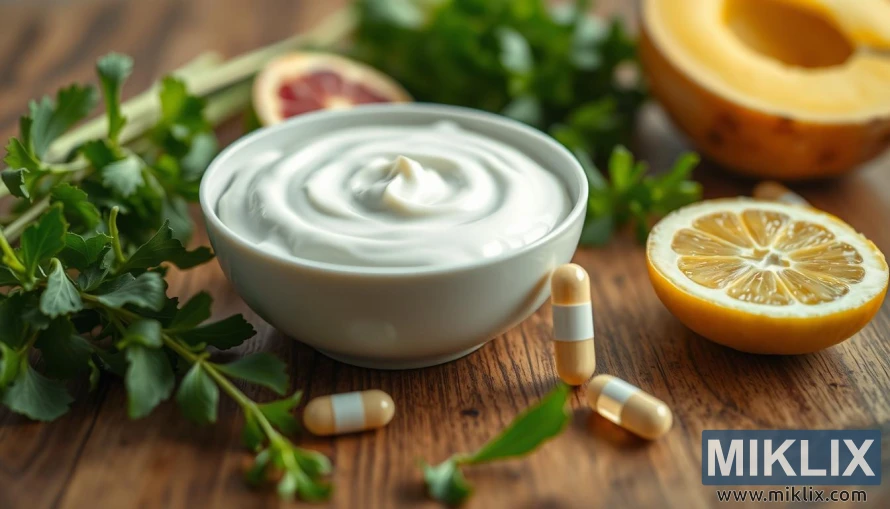Spoonfuls of Wellness: The Yoghurt Advantage
Published: May 15, 2025 at 11:52:19 AM UTC
Yogurt is more than a tasty treat; it's a food full of nutrients. It has a creamy texture and a tangy taste. Yogurt is great in many dishes and is a good source of probiotics. Yogurt does more than just taste good. It helps with digestion, boosts your immune system, and can help with weight. Let's look at how probiotic yogurt can improve your health, making it a great choice for your diet.

Key Takeaways
- Yogurt is a versatile and nutrient-dense food.
- It offers numerous health benefits, such as improved digestion.
- Probiotic yogurt supports immune function.
- Incorporating yogurt can assist in weight management.
- Yogurt contributes to overall health and wellness.
What is Yogurt and How is it Made?
Yogurt is a creamy, tangy dairy product made from milk. It starts when special yogurt cultures are added to the milk. This can be skim, whole, or even non-dairy.
These cultures turn the milk's natural sugar, lactose, into lactic acid. This change makes the milk thicker and gives yogurt its unique taste.
Learning about yogurt's making process shows how it turns into a nutritious food. The time it ferments can change, making yogurts with different textures and tastes. There are many types, from plain to flavored, for everyone's liking.
Knowing how yogurt is made helps us appreciate its texture and taste. It's a healthy addition to a balanced diet. Exploring yogurt making reveals its value and enjoyment.
Yogurt: A Nutrient Powerhouse
Yogurt is a food packed with nutrients. It's not just tasty but also very good for you. A cup of yogurt gives you almost half of the calcium you need each day. This is key for strong bones.
Yogurt also has:
- Protein, which helps muscles grow and repair
- Vitamin B12, important for nerves and making red blood cells
- Magnesium, needed for energy and muscle work
- Potassium, helps keep blood pressure healthy
These nutrients make yogurt a great choice for your diet. Adding yogurt to your meals boosts your nutrient intake. It also brings a yummy flavor to many dishes.
Health Benefits of Yogurt on Digestion
Yogurt is great for your digestion because it's full of probiotics. These probiotics, like Lactobacillus and Bifidobacteria, help keep your gut healthy. They can even help with bloating and constipation.
Yogurt might also help if you have irritable bowel syndrome (IBS). Studies show it can help you feel better after taking antibiotics. This makes yogurt very important for a healthy gut.

Yogurt as a Source of Protein
Yogurt is a great source of protein, making it perfect for boosting your diet. It's packed with protein, which is easy to add to your meals. Greek yogurt, in particular, has more protein than regular yogurt, making it a top pick for health lovers.
Protein helps control hunger. Eating high-protein yogurt keeps you feeling full longer. This is great for those trying to manage their weight. Research shows that adding high-protein snacks like yogurt to your diet can cut down on calories. Making yogurt a part of your meals or snacks can be both tasty and beneficial for your health.
Boosting Immune Function with Yogurt
Yogurt is key in boosting our immune health. It's packed with probiotics, which are good bacteria. These bacteria fight off inflammation and strengthen our immune system.
Yogurt also has vitamin D, which is great for our immune cells. This vitamin helps keep us safe from infections. So, eating yogurt not only tastes good but also keeps us healthy.
Yogurt and Heart Health
Yogurt is great for your heart health. It helps manage yogurt and cholesterol levels. Studies show it can lower "bad" cholesterol and triglycerides.
Yogurt also boosts your HDL (good cholesterol) levels. Even full-fat yogurt can be good for you. It helps lower blood pressure, which is key to avoiding heart disease.
It's important to know about the diets fats in yogurt. Not all fats are bad for your heart. Yogurt's good fats are beneficial in small amounts. This makes yogurt a great addition to a healthy diet.

Yogurt's Role in Weight Management
Adding yogurt to your meals can help with weight management. It's packed with protein, which keeps you full and helps you eat fewer calories. This can lead to a healthier weight over time.
Studies show that eating yogurt often can lower body weight and fat. This makes yogurt a great tool for those trying to lose weight. It's a key part of a diet that fights obesity.
Yogurt is not just tasty; it's also good for your weight. You can mix it with fruits, nuts, or cereals. This makes it easy to include in your diet, helping you reach your health goals.
Effects of Yogurt on Bone Health
Yogurt is a great source of calcium and phosphorus. These minerals are key for strong bones. Eating yogurt regularly can help keep your bones strong for life. It's packed with nutrients that are good for your bones.
Adding yogurt to your meals helps with calcium and bone health. It can also lower the risk of osteoporosis, which is common in older adults. Many yogurts have vitamin D, which helps your body use calcium better.
Here are some benefits of yogurt for your bones:
- Increased bone density through consistent calcium intake
- Enhanced absorption of calcium due to vitamin D
- Support for overall bone structure and health
Improving Skin Health with Yogurt
Yogurt is becoming a key player in natural skincare. It's packed with probiotics, which help keep the skin's microbiome in balance. This leads to better skin health overall. Yogurt also moisturizes well, making it great for natural hydration.
Its anti-inflammatory properties can calm irritated skin. This makes it perfect for those with sensitive skin.
Using yogurt as a face mask is a popular skincare method. Nonfat Greek yogurt, in particular, is known for brightening and tightening the skin. Applying a yogurt face mask can deeply nourish and rejuvenate your skin.
Adding yogurt to your skincare routine is simple and rewarding. You can use it directly on your skin or mix it into a face mask. It's a budget-friendly way to enhance your skin's look and feel.

Yogurt Varieties to Consider
Yogurt comes in many delicious forms, catering to various dietary needs and preferences. Understanding the different types of yogurt can help you choose the best option for your health goals.
Some notable types of yogurt include:
- Greek yogurt: Known for its thick texture and high protein content, Greek yogurt is perfect for satisfying hunger and supporting muscle health.
- Skyr: This traditional Icelandic yogurt is similar to Greek yogurt but often contains even more protein and has a slightly tangier flavor.
- Kefir: A fermented drink made with milk or water, kefir is rich in probiotics and has a thinner consistency, making it easy to blend into smoothies.
- Plant-based yogurt: Made from almond, coconut, soy, or oat, these non-dairy options are perfect for those with lactose intolerance or dairy allergies.
- Traditional yogurt: The classic variety is great for everyday use and offers a balance of protein, carbohydrates, and beneficial bacteria.
With so many choices available, exploring the various types of yogurt can enhance your meals and contribute to a balanced diet.
How to Incorporate Yogurt into Your Diet
Adding yogurt to your meals and snacks is easy and tasty. You can make many different yogurt recipes. Try blending it into smoothies for a cool and protein-rich snack.
Yogurt can also be used in many ways. Mix it into salad dressings, sauces, or use it instead of sour cream. This adds a creamy touch to your dishes.
To make yogurt even healthier, add fresh fruits, nuts, or seeds. This not only makes it taste better but also adds important vitamins and fats. Having yogurt ready for snacks can help you eat better.
There are lots of ways to enjoy yogurt as a snack. Mix it with granola or use it as a veggie dip. Yogurt is a great way to keep your diet balanced and your meals tasty.
Potential Downsides of Eating Yogurt
Yogurt can be good for you, but it's not perfect for everyone. People with lactose intolerance might find it hard to digest. This can cause bloating, gas, and cramps.
Also, yogurt can have a lot of sugar, even in the flavored kinds. Brands often add sugar to make it taste better. Too much sugar can lead to weight gain and other health problems. Always check the labels for sugar content and choose plain yogurt instead.
Yogurt can be a great addition to your diet, but knowing the downsides is important. Think about your health and what you like when picking a yogurt. This way, you can enjoy it without any issues.
Research Supporting Yogurt's Health Benefits
Many studies have shown that yogurt is good for our health. It might help protect us from serious diseases. For example, eating yogurt often could lower the risk of heart disease and type 2 diabetes.
Yogurt is also great for our gut, helping us manage our weight and keep our bones strong. The probiotics in yogurt keep our digestive system healthy. Plus, it can help us stay at a healthy weight.
More research is needed to learn all about yogurt's benefits. Scientists are working hard to understand how yogurt fits into a healthy diet. They hope to find even more ways yogurt can help us stay healthy.
Conclusion
Yogurt is a versatile and nutritious food that boosts your health. It offers many benefits, like better digestion and a stronger immune system. It also helps your heart and aids in weight management.
Adding yogurt to your meals is more than just a tasty choice. It's a way to care for your health. Whether you like Greek yogurt or fruity probiotic yogurt, there's something for everyone.
Make yogurt a regular part of your diet to enjoy its health benefits. Its delicious taste and many health advantages make it a great choice. Yogurt is a simple way to support your body's well-being.
Further Reading
If you enjoyed this post, you may also like these suggestions:
- Cashews Uncovered: The Tasty Way to Boost Your Well-Being
- Casein Protein: The Slow-Release Secret to All-Night Muscle Repair and Satiety
- NAC Unveiled: Discovering the Secret Supplement for Oxidative Stress and Immune Health
